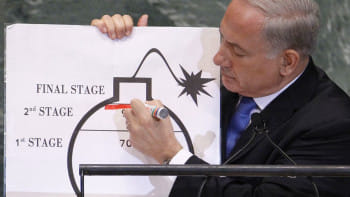Iran’s retaliation: What fresh hell awaits the Middle East?

As over 200 ballistic missiles lit up the skies over Tel Aviv and other parts of Israel on the night of October 1, tensions in the Middle East have escalated further. Iran's retaliatory strike against Israel comes just days after an Israeli airstrike in Beirut killed Hassan Nasrallah—the leader of the Lebanon-based and Iran-backed militant group Hezbollah.
Israel was already taking the fight to Hezbollah long before Nasrallah's killing. Earlier in April this year, after a suspected Israeli strike had killed a top Iranian military commander in Damascus, tensions between Israel and Iran started to increase. The assassination of Nasrallah escalated the conflict as US intelligence feared retaliation from Iran. Those fears came true on Tuesday as Iran launched hundreds of missiles towards Israel.
As reported by US and Israeli officials during the early hours following the attack, most of the missiles were intercepted by Israeli air defence systems with support from US Navy destroyers stationed in the region.
At the time of writing this article, Israel had already vowed to seek revenge for Iran's missile strikes. As reported by multiple international media outlets, Israel might specifically target Iran's oil refineries and its nuclear facilities, the latter of which is of particular interest to the US top brass.
A nuclear-armed Iran puts several vital US national security interests at risk, most of which concern the Middle East. While the US itself is not too eager to take out Iran's nuclear programme by itself, having Israel do so on their behalf will work just fine as it would be protecting US interests in the Middle East including its ties with Saudi Arabia.
Given what happened with Hezbollah's pagers and walkie-talkies exploding out of nowhere, courtesy of Israel, experts believe that the strike on Iran's nuclear sites is more likely to be a cyberattack attack instead of a traditional military one, although a military strike isn't being completely ruled out.
The US, however, will not risk getting involved at this scale, especially if it's a military attack on Iranian nuclear sites. That being said, some US lawmakers, like Senator Lindsey Graham, are eager to see a full-on airstrike on Iran's oil refineries, and they are pushing the Biden administration to coordinate this attack.
The scale to which the US will be willing to participate in Israel's retaliatory strike against the regime in Tehran is not yet fully understood. The country has so far only used its military might to defend Israel against aerial threats posed by Iran and different militant groups operating in the region. However, it remains to be seen what the Iranian strike on Israel means for the overall presence of the US military in the Middle East.
The US already has one nuclear-powered aircraft carrier—the USS Abraham Lincoln—stationed in the region. It is now sending another carrier—the USS Harry S Truman—there as well. The USS Georgia—a guided missile submarine—also arrived in the Middle East in September to specifically aid Israel against Iranian and Hezbollah attacks.
However, these vessels are in place strictly for intercepting attacks on Israel and other US allies. The US is not looking to have these vessels engage in direct conflict anytime soon, most likely never. The Biden administration is treading the waters with caution as it does not want to be seen as a direct contributor to the rising tensions in the Middle East. This, of course, could change depending on how Russia reacts to the situation in the region and what the escalation in the Middle East could mean for Putin in the long run.
For years, Russia has chosen to maintain a considerable distance from events and conflicts that have taken place in the Middle East. However, following the war in Ukraine, Moscow has been seen cosying up to Iran, leading to serious concerns in the US as well as Israel.
Russia often took Iran's side against Israel in the past year or so. Iran has also been accused by the West of supplying Russia with ballistic missiles which are being used in Ukraine. Following the acquisitions, the West has also sanctioned Iranian civil aviation and blacklisted its flagship airliner Iran Air, cutting off its access to Europe.
Keeping Iran engaged in long-term conflict in the Middle East is something the US might see as a win. As Iran gets tied up with Israel, it might not be willing to sell ammunition to Russia. On the other hand, Russia can simply turn to North Korea to seek alternatives to Iranian missiles and might even lower its vocal support for the Iranian regime.
Countries like Qatar and Saudi Arabia are also expected to maintain their distance from this escalating situation. Qatar, who acted as a mediator between Israel and Hamas and have maintained close relations with Iran, will have its work cut out should it try to intervene in this situation. Saudi Arabia, on the other hand, resumed its diplomatic ties with Iran last year, but tensions still exist between the two countries. Besides, choosing to side with either Iran or Israel in such times is not something the Kingdom will risk. Aside from tensions with Iran, it still does not recognise Israeli sovereignty. Its best interests, too, lie in staying neutral while murmuring the need for diplomatic resolutions to the conflicts between Iran and Israel.
Israel, no matter how far it is pushed, is not looking to slow down its attacks in Gaza and Lebanon. It is looking to continue fighting on all fronts across the Middle East.
Everything surrounding this new escalation, how long it will drag on, and what awaits the Middle East as a result of this is mostly speculative at the moment. However, history suggests that the Middle East is set to be dragged into an all-out war sooner than we can anticipate. The US, as usual, will play a key role in deciding the fate of this conflict. However, given Israeli Prime Minister Benjamin Netanyahu's tendency to ignore US suggestions at times, the fate of this conflict might be decided on which country runs out of missiles and ammunition first.
Faisal Bin Iqbal is the In-Charge of Campus, Rising Stars, and Star Youth.
Views expressed in this article are the author's own.
Follow The Daily Star Opinion on Facebook for the latest opinions, commentaries and analyses by experts and professionals. To contribute your article or letter to The Daily Star Opinion, see our guidelines for submission.

 For all latest news, follow The Daily Star's Google News channel.
For all latest news, follow The Daily Star's Google News channel. 







Comments